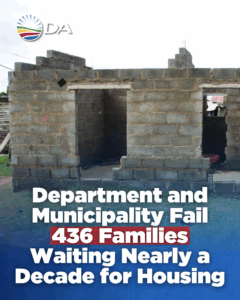The Eastern Cape has the highest share of elderly residents in South Africa, yet far too many older persons are living without the support they need. Stats SA’s latest mid-year estimates show that 12.9% of the province’s population is 60 years and older.
These are grandparents who are increasingly taking care of their grandchildren. Skip-generation households are most common in the Eastern Cape, and female-headed homes are also highest here. This places emotional and financial strain on grandmothers who are already stretching meagre resources to feed and educate children.
The Democratic Alliance (DA) believes that the Senior Citizens Parliament should be more than a ceremonial gathering. It must drive urgent, measurable actions that protect dignity, strengthen community-based care, and support the grandparents who are holding families together.
The reality is that social grants are the primary source of income for almost two in five households in the Eastern Cape, and receipt of grants is more prevalent here than wages. Old-age pensions and child support grants are therefore doing the heavy lifting in our poorest communities, yet they are often insufficient to meet basic needs.
Residential care is scarce. The Department’s own performance plan targets placing 1,522 older persons in funded residential facilities in the Eastern Cape, which points to limited capacity in the face of rising need.
Policy already emphasises community-based care under the Older Persons Act, but that only works if centres and service points are properly funded, staffed, and monitored.
The recent revelation that children are still dying of severe acute malnutrition in the province is deeply concerning. Strengthening support to elderly caregivers, many of whom are primary carers of grandchildren, is a practical lever to reduce child hunger by stabilising household food security and access to services.
The DA proposes a focused five-point programme arising from today’s sitting.
- First, a province-wide audit of registered residential facilities and community service centres to verify capacity, staffing, and compliance, followed by a funding catch-up plan where gaps are identified.
- Second, ring-fenced support packages for skip-generation households that combine social work services, nutrition support, and school-linked referrals.
- Third, an Older Persons Community Care grant top-up pilot in the poorest districts to test whether modest additions to existing grants improve food security and attendance at service centres.
- Fourth, integrated referral pathways between Social Development and Health for frail care, home-based care, and chronic medication delivery.
- Fifth, quarterly reporting to the Legislature on outputs and outcomes so that progress can be tracked and corrected.
These steps are realistic and immediately actionable. They align with existing law and the provincial mandate, and they would relieve pressure on elderly caregivers while improving child nutrition and household stability.
Older persons in the Eastern Cape deserve more than words. They deserve safe homes, reliable community services, and support that recognises the central role they play in caring for our children.
The DA will be submitting these recommendations to the Speaker’s office as our contribution to the sitting. The people of the Eastern Cape deserve leadership that delivers, and a future built on dignity, opportunity, and honest government.








